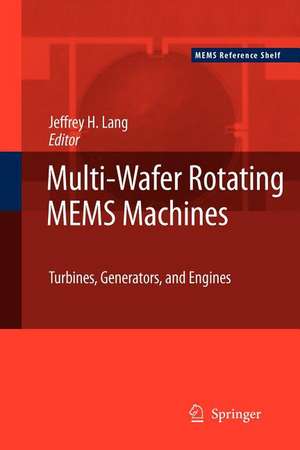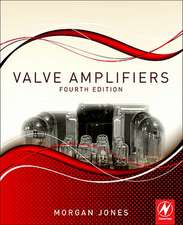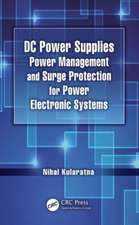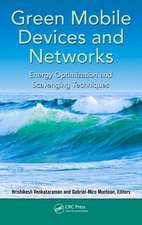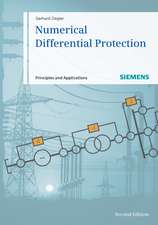Multi-Wafer Rotating MEMS Machines: Turbines, Generators, and Engines: MEMS Reference Shelf
Editat de Jeffrey Langen Limba Engleză Paperback – 3 mar 2012
The overall objective of the Micro Engine Project was to develop a small but power-dense gas turbine generator based on MEMS fabrication technologies. Thus, the project sought to develop a fuel-burning jet engine that would drive an electric generator to produce electric power for general purpose use. Along the way, the project would advance the science and engineering of many disciplines from the MEMS perspective.
The Micro Engine Project was by its very nature a highly mult-disciplinary project pursuing advances in materials, structures, fabrication, combustion, heat transfer, turbomachinery, bearings and electromechanics, all at the MEMS scale. Many of these topics are addressed in this volume, including:
materials structures and packaging
multi-wafer MEMS fabrication and and bonding technologiesElectroplating magnetic components
electroplating magnetic structures into silicon
very-high-speed air bearings
thermofluids and turbomachinery
electric and magnetic generators
combustion
About The MEMs Reference Shelf:
"The MEMs Reference Shelf is a series devoted to Micro-Electro-Mechanical Systems (MEMs) which combine mechanical, electrical, optical, or fluidic elements on a common microfabricated substrate to create sensors, actuators, and microsystems. The series, authored by leading MEMs practitioners, strives to provide a framework where basic principles, known methodologies and new applications are integratedin a coherent and consistent manner."
STEPHEN D. SENTURIA
Massachusetts Institute of Technology, Professor of Electrical Engineering, Emeritus
| Toate formatele și edițiile | Preț | Express |
|---|---|---|
| Paperback (1) | 952.89 lei 43-57 zile | |
| Springer Us – 3 mar 2012 | 952.89 lei 43-57 zile | |
| Hardback (1) | 959.04 lei 43-57 zile | |
| Springer Us – 30 sep 2009 | 959.04 lei 43-57 zile |
Preț: 952.89 lei
Preț vechi: 1162.06 lei
-18% Nou
Puncte Express: 1429
Preț estimativ în valută:
182.34€ • 190.85$ • 151.76£
182.34€ • 190.85$ • 151.76£
Carte tipărită la comandă
Livrare economică 31 martie-14 aprilie
Preluare comenzi: 021 569.72.76
Specificații
ISBN-13: 9781461424598
ISBN-10: 1461424593
Pagini: 472
Ilustrații: XVI, 456 p. 302 illus.
Dimensiuni: 155 x 235 x 25 mm
Greutate: 0.66 kg
Ediția:2010
Editura: Springer Us
Colecția Springer
Seria MEMS Reference Shelf
Locul publicării:New York, NY, United States
ISBN-10: 1461424593
Pagini: 472
Ilustrații: XVI, 456 p. 302 illus.
Dimensiuni: 155 x 235 x 25 mm
Greutate: 0.66 kg
Ediția:2010
Editura: Springer Us
Colecția Springer
Seria MEMS Reference Shelf
Locul publicării:New York, NY, United States
Public țintă
ResearchCuprins
to PowerMEMS.- System Design Considerations and Device Overview.- Materials, Structures and Packaging.- Microengine Fabrication.- Fabrication of Microscale Rotating Magnetic Machines.- High-Speed Gas Bearings for Micro-Turbomachinery.- Thermofluidics and Turbomachinery.- Motors and Generators.- Microcombustors for Rotating Machinery.
Textul de pe ultima copertă
Multi-Wafer Rotating MEMS Machines: Turbines, Generators, and Engines is an outgrowth of the MIT Micro Engine Project. This project began at the Massachusetts Institute of Technology in the Fall of 1995, and later expanded through collaborations with the Georgia Institute of Technology, the Clark Atlanta University, and the University of Maryland at College Park.
The overall objective of the Micro Engine Project was to develop a small but power-dense gas turbine generator based on MEMS fabrication technologies. Thus, the project sought to develop a fuel-burning jet engine that would drive an electric generator to produce electric power for general purpose use. Along the way, the project would advance the science and engineering of many disciplines from the MEMS perspective.
The Micro Engine Project was by its very nature a highly mult-disciplinary project pursuing advances in materials, structures, fabrication, combustion, heat transfer, turbomachinery, bearings and electromechanics, all at the MEMS scale. Many of these topics are addressed in this volume, including:
materials structures and packaging
multi-wafer MEMS fabrication and and bonding technologiesElectroplating magnetic components
electroplating magnetic structures into silicon
very-high-speed air bearings
thermofluids and turbomachinery
electric and magnetic generators
combustion
About The MEMs Reference Shelf:
"The MEMs Reference Shelf is a series devoted to Micro-Electro-Mechanical Systems (MEMs) which combine mechanical, electrical, optical, or fluidic elements on a common microfabricated substrate to create sensors, actuators, and microsystems. The series, authored by leading MEMs practitioners, strives to provide a framework where basic principles, known methodologies and new applications are integratedin a coherent and consistent manner."
STEPHEN D. SENTURIA
Massachusetts Institute of Technology, Professor of Electrical Engineering, Emeritus
The overall objective of the Micro Engine Project was to develop a small but power-dense gas turbine generator based on MEMS fabrication technologies. Thus, the project sought to develop a fuel-burning jet engine that would drive an electric generator to produce electric power for general purpose use. Along the way, the project would advance the science and engineering of many disciplines from the MEMS perspective.
The Micro Engine Project was by its very nature a highly mult-disciplinary project pursuing advances in materials, structures, fabrication, combustion, heat transfer, turbomachinery, bearings and electromechanics, all at the MEMS scale. Many of these topics are addressed in this volume, including:
materials structures and packaging
multi-wafer MEMS fabrication and and bonding technologiesElectroplating magnetic components
electroplating magnetic structures into silicon
very-high-speed air bearings
thermofluids and turbomachinery
electric and magnetic generators
combustion
About The MEMs Reference Shelf:
"The MEMs Reference Shelf is a series devoted to Micro-Electro-Mechanical Systems (MEMs) which combine mechanical, electrical, optical, or fluidic elements on a common microfabricated substrate to create sensors, actuators, and microsystems. The series, authored by leading MEMs practitioners, strives to provide a framework where basic principles, known methodologies and new applications are integratedin a coherent and consistent manner."
STEPHEN D. SENTURIA
Massachusetts Institute of Technology, Professor of Electrical Engineering, Emeritus
Caracteristici
Describes how turbine generators, motor compressors, rocket motors and combustors have been used as energy sources at the MEMS scale Discusses in great detail how to model and manage systems-level trade-offs in complex MEMS devices using the gas turbine engine, and in particular its motor compressors and turbine generators Provides a detailed discussion of the critical integration and design decisions that must take place when building a power supply at the MEMs scale Contributing authors are mostly at MIT and are the pioneers and leading researchers in the field of Power MEMs
